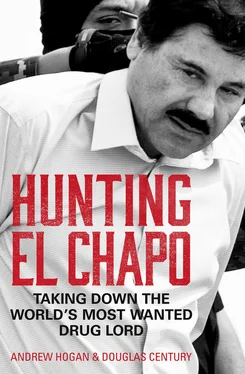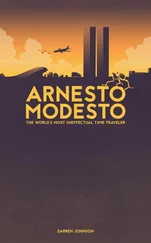IN MAY 1993, around the time of the Posada murder, I was fifteen hundred miles away, in my hometown of Pattonville, Kansas, diagramming an intricate pass play to my younger brother. We were Sweetness and the Punky QB—complete with regulation blue-and-orange Bears jerseys—huddling up in the front yard against a team made up of my cousins and neighbors. My sister and her friends were dressed up as cheerleaders, with homemade pompoms, shouting from the sidelines.
My brother, Brandt, always played the Walter Payton role. I was Jim McMahon, and I was a fanatic—everyone teased me about it. Even for front-yard games, I’d have to have all the details just right, down to the white headband with the name ROZELLE, which I’d lettered with a black Magic Marker, just like the one McMahon had worn in the run-up to the 1985 Super Bowl.
None of us weighed more than a hundred pounds, but we took those front- yard games seriously, as if we really were Payton, McMahon, Singletary, Dent, and the rest of the Monsters of the Midway. In Pattonville—a town of three thousand people, fifty-two miles outside Kansas City—there wasn’t much else to do besides play football and hunt. My father was a firefighter and lifelong waterfowl hunter. He’d taken me on my first duck hunt at age eight and bought me my first shotgun—a Remington 870 youth model—when I turned ten.
Everyone expected I’d become a firefighter, too—my greatgrandfather, my grandfather, and three uncles had all been firemen. I’d spend hours at the fire station following my dad around, trying on his soot-stained leather fire helmet and climbing in and out of the trucks in the bay. In fifth grade, I brought home a school paper and showed my mom:
“Someday I’m going to be . . . a fireman, a policeman, or a spy detective.”
But as long as I could remember, I’d really been dead set on becoming one thing: a cop. And not just any cop—a Kansas State Trooper.
I loved the State Troopers’ crisp French-blue uniforms and navy felt campaign hats, and the powerful Chevrolets they got to drive. For years I had an obsession with drawing police cars. It wasn’t just a hobby, either—I’d sit alone in my bedroom, working in a feverish state. I had to have all the correct colored pens and markers lined up, drawing and shading the patrol cars in precise detail: correct light bar, insignia, markings, wheels—the whole works had to be spot-on, down to the exact radio antennas. I’d have to start over even if the slightest detail looked off. I drew Ford Crown Vics and Explorers, but my favorite was the Chevy Caprice with the Corvette LT1 engine and blacked- out wheels. I’d often dream while coloring, picturing myself behind the wheel of a roaring Caprice, barreling down US Route 36 in hot pursuit of a robbery suspect...
Fall was my favorite time of year. Duck hunting with my dad and brother. And football. Those front-yard dreams now playing out under the bright stadium lights. Our varsity team would spend Thursday nights in a barn or some backwoods campsite, sitting around a fire and listening to that week’s motivational speaker, everyone’s orange helmets, with the black tiger paws on the sides, glowing in the flickering light.
Life in Pattonville revolved around those Friday-night games. All along the town’s roads you’d see orange-and-black banners, and everyone would come and watch the Tigers play. I had my own pregame ritual, blasting a dose of Metallica in my headphones:
Hush little baby, don’t say a word And never mind that noise you heard
After high school, I was convinced that I’d live in the same town where my parents, grandparents, uncles, aunts, and dozens of cousins lived. I had no desire to go anyplace else. I never could have imagined leaving Pattonville. I never could have imagined a life in a smog- cloaked city of more than 26 million, built on top of the ancient Aztec capital of Tenochtitlán...
Mexico? If pressed—under the impatient glare of my thirdperiod Spanish teacher—I probably could have found it on the map. But it might as well have been Madagascar.
I WAS SOON THEblack sheep: the only cop in a family of firefighters. After graduating from Kansas State University with a degree in criminal justice, I’d taken the written exam for the Kansas Highway Patrol, but a statewide hiring freeze forced me in another direction. A salty old captain from the local sheriff ’s office offered me a job as a patrol deputy with Lincoln County, opening my first door to law enforcement.
It wasn’t my dream job, but it was my dream ride: I was assigned a 1995 Chevrolet Caprice, complete with that powerhouse Corvette engine—the same squad car I’d been drawing and coloring in detail in my bedroom since I was ten years old. Now I got to take it home and park it overnight in the family driveway.
Every twelve-hour shift, I was assigned a sprawling twenty-by thirty-mile zone. I had no patrol-car partner: I was just one babyfaced deputy covering a vast countryside scattered with farmhouses and a few towns. The closest deputy would be in his or her zone, just as large as mine. If we were on the opposite ends of our respective zones and needed backup, it could take thirty minutes to reach each other.
I discovered what that really meant one winter evening during my rookie year when I went to look for a six-foot-four, 260-pound suspect—name of “Beck”—who’d just gotten out of the Osawatomie State Hospital psychiatric ward. I’d dealt with Beck once already that night, after he’d been involved in a domestic disturbance in a nearby town. Just after 8 p.m., my in-car mobile data terminal beeped with a message from my sergeant: “Hogan, you’ve got two options: get him out of the county or take him to jail.”
I knew I was on my own—the sergeant and other deputies were all handling a vehicle in the river, which meant my colleagues were twenty minutes away at a minimum. As I drove down a rural gravel road, in my headlights I caught a dark figure ambling on the shoulder. I let out a loud exhale, pulling to a stop.
Beck.
Whenever I had a feeling that things were going to get physical, I tended to leave my brown felt Stratton hat on the passenger seat. This was one of those times.
“David twenty-five,” I radioed to dispatch. “I’m going to need another car.”
It was the calmest way of requesting immediate backup. But I knew the truth: there wasn’t another deputy within a twenty-five mile radius.
“The Lone fuckin’ Ranger,” I muttered under my breath, stepping out of the Caprice. I walked toward Beck cautiously, but he continued walking away, taking me farther and farther from my squad car’s headlights, and deeper and deeper into the darkness.
“Sir, I can give you a ride up to the next gas station or you can go to jail,” I said, as matter-of-factly as I could. “Your choice tonight.”
Beck ignored my question completely, instead picking up his pace. I half jogged, closed the distance, and quickly grabbed him around his thick bicep to put him in an arm bar. Textbook—just how I’d been taught at the academy.
But Beck was too strong to hold, and he lunged forward, trying to free his arm. I felt the icy gravel grinding beneath us as we both tried to gain footing. Beck snatched me in a bear hug, and there were quick puffs of breath in the cold night air as we locked eyes for a split second, faces separated by inches. I had zero leverage—my feet now just barely touched the ground. It was clear that Beck was setting up to body- slam me.
I knew there was no way I could outgrapple him, but I managed to rip my right arm loose and slammed my fist into his pockmarked face, then again, until a third clean right sent Beck’s head snapping back and he finally loosened his grip. I planted my feet to charge, as if I were going to make a football tackle, and rammed my shoulder into Beck’s gut, driving him to the ground. Down into the steep frozen ditch we barrel-rolled on top of each other, Beck trying to grab for my .45-caliber Smith & Wesson pistol, unclasping the holster snaps, nearly getting the gun free.
Читать дальше












